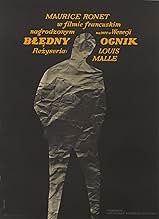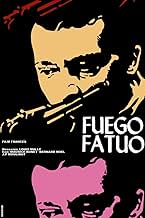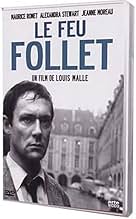IMDb-BEWERTUNG
7,8/10
11.108
IHRE BEWERTUNG
Der depressive Alain Leroy verlässt die Klinik, in der er zur Entgiftung war. Er sucht Freunde, Bekannte und Frauen auf, um einen Grund für einen Neuanfang zu finden. Wird es ihm helfen?Der depressive Alain Leroy verlässt die Klinik, in der er zur Entgiftung war. Er sucht Freunde, Bekannte und Frauen auf, um einen Grund für einen Neuanfang zu finden. Wird es ihm helfen?Der depressive Alain Leroy verlässt die Klinik, in der er zur Entgiftung war. Er sucht Freunde, Bekannte und Frauen auf, um einen Grund für einen Neuanfang zu finden. Wird es ihm helfen?
- Regie
- Drehbuch
- Hauptbesetzung
- Auszeichnungen
- 2 Gewinne & 2 Nominierungen insgesamt
René Dupuy
- Charlie
- (as René Dupuis)
Empfohlene Bewertungen
Le Feu Follet or "Will o'the wisp" as it can be translated into English is one of the most important philosophical films made by the great master of French cinema Louis Malle.It is based on a book written by Pierre Drieu la Rochelle who was influenced by Dadaism. Although this film talks of a difficult albeit dark theme of suicide the film's overall mood is not at all gloomy. This is because there are plenty of scenes infused with day to day humor.The film is about a protagonist who has lost all interest in life.Maurice Ronet,a major French film star of the sixties plays the lead role.He is a sort of celebrity among his circle of socialites and he is fed up of their useless company.The film portrays the last days of a person suffering from a drug habit.In some ways this film is an attack on middle class or French bourgeoisie.Although the protagonist is a part of it,he nevertheless makes vain attempts to untangle himself from it.If a separate genre of suicide films is formed, this film will easily find a proud place in that category.
THE FIRE WITHIN is a drama about a former alcoholic, who is at the crossroads between life and death in a state of a deep depression. It is based on the novel "Will O' the Wisp" by Pierre Drieu La Rochelle.
Alain, a recovering alcoholic at a rehabilitation clinic in Versailles suffers with a depression. He often thinks about suicide, but still tries to find some valid reasons for living. He is in complete contrast with a behavior of his friends, which further enhances his internal conflict...
Mr. Malle gently touches sore points of a depressed man. His hero is empty and defeated man, who is trapped between a drunken past and an uncertain future. Many of the protagonists, who are full of compassion and love, going through his frustrating life. He's a lost soul, who can not let go of his depressive everyday life. However, a man, without an imagination and love, must find his own peace and certainty. A recovery from alcohol is an ironic view of a collapsed life.
Regardless of a state of his mind and heart, his tragic appearance is not quite clear. This is a kind of flaw of this film, because the main protagonist has condemned himself to a tragic end, before he has considered any options. An authentic scenery emphasizes his escape from any opportunities in life.
Maurice Ronet as Alain Leroy has offered a convincing performance. He is a lonely man who helplessly wanders...search, and then run away from love and certainty.
Life is a kind of agony in this case.
Alain, a recovering alcoholic at a rehabilitation clinic in Versailles suffers with a depression. He often thinks about suicide, but still tries to find some valid reasons for living. He is in complete contrast with a behavior of his friends, which further enhances his internal conflict...
Mr. Malle gently touches sore points of a depressed man. His hero is empty and defeated man, who is trapped between a drunken past and an uncertain future. Many of the protagonists, who are full of compassion and love, going through his frustrating life. He's a lost soul, who can not let go of his depressive everyday life. However, a man, without an imagination and love, must find his own peace and certainty. A recovery from alcohol is an ironic view of a collapsed life.
Regardless of a state of his mind and heart, his tragic appearance is not quite clear. This is a kind of flaw of this film, because the main protagonist has condemned himself to a tragic end, before he has considered any options. An authentic scenery emphasizes his escape from any opportunities in life.
Maurice Ronet as Alain Leroy has offered a convincing performance. He is a lonely man who helplessly wanders...search, and then run away from love and certainty.
Life is a kind of agony in this case.
Beautifully detailed black and white study of a man looking for a reason to go on living and not really finding it. Updates the excellent 1920s novel on which it is based to the 1960s without sacrificing anything of the former's timeless relevance. To give a (very) rough point of reference, it is something of a subdued Left Bank version of "La Dolce Vita", although Malle's film has none of the frantic burlesque episodes of LDV. Rather, the feel of the film is consistently weary and melancholic. Poetic and moving, it's an existentialist classic.
Wonderful study of the last day in the life of a man. This movie has one specific scene where Alan Leroy (Maurice Ronet), sitting at a cafe in Paris, takes his first alcoholic drink after months of rehabilitation. This scene is complimented by stunning photography of Chislain Cloquet and the haunting music of Eric Satie. Malle captures the true meaning of existentialist philosophy and manages to create a movie that does not wallow in self-pity but instead celebrates our ability to choose whether to live or die.
One of the triumphs of the otherwise often overrated nouvelle vague,Louis Malle's adaptation of a Drieu de la Rochelle has not aged bit.Thanks to Maurice Ronet ,who portrays a suicidal man,probably the most beautiful performance of this kind.The movie is nothing but a long wandering in a mental hospital,in the Parisian bistros,in the posh world where an Antonioniesque bourgeoisie is killing time (see Alexandra Stewart's character).If I mention Antonioni,it''s not by chance ;actually Malle succeeds here where Antonioni only partially does.The difference ,I think,lies in the fact that we have here a human being,made of flesh and blood,who exists,and I would like to point out once again what a great actor the late Maurice Ronet was.Eric Satie's music perfectly captures the doomed atmosphere.This is arguably Louis Malle 's finest,one of the rare movies which achieve the delicate balance between the strong screenplay and the "liberties" dear to the new wave creators. Yes the new wave did produce great movies:"la tête contre les murs " (Franju)"Cléo de 5 à 7" (Varda)"Lola" (Demy)and this one are jewels on its crown.
Wusstest du schon
- WissenswertesFor the first two days, filming was done in color. However, director Louis Malle realized that this was a distraction from the story, so he decided to film in black-and-white. An assistant also later declared that the shooting atmosphere on the set was rather gloomy.
- PatzerAs Alain walks on the streets of Paris, the crew (pushing the dolly) is visible on the shop windows he passes by.
- Zitate
Alain Leroy: I'm killing myself because you didn't love me, because I didn't love you. Because our ties were loose, I'm killing myself to tighten them. I leave you with an indelible stain.
- SoundtracksTrois Gymnopédies
Written by Erik Satie
Top-Auswahl
Melde dich zum Bewerten an und greife auf die Watchlist für personalisierte Empfehlungen zu.
- How long is The Fire Within?Powered by Alexa
Details
- Erscheinungsdatum
- Herkunftsland
- Offizieller Standort
- Sprache
- Auch bekannt als
- The Fire Within
- Drehorte
- Produktionsfirma
- Weitere beteiligte Unternehmen bei IMDbPro anzeigen
- Laufzeit1 Stunde 48 Minuten
- Farbe
- Sound-Mix
- Seitenverhältnis
- 1.66 : 1
Zu dieser Seite beitragen
Bearbeitung vorschlagen oder fehlenden Inhalt hinzufügen


![Bande-annonce [OV] ansehen](https://m.media-amazon.com/images/M/MV5BODdiNzczOTktMmMxMC00ZGQ0LTg4YWItZWEzN2FkZTViODk1XkEyXkFqcGdeQXRyYW5zY29kZS13b3JrZmxvdw@@._V1_QL75_UY281_CR0)



























